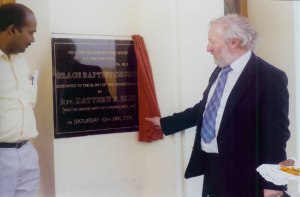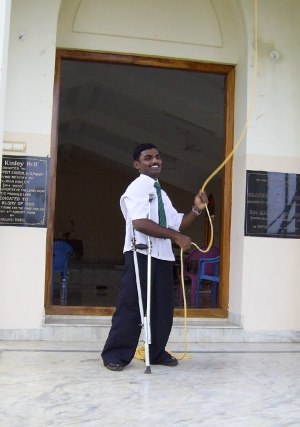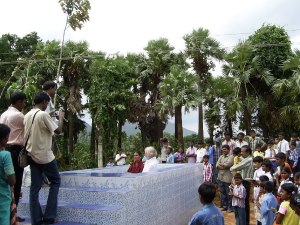Grace Baptist Church, N G Palem
If you have watched any of the films produced by Grace Third
World Fund you will have seen that when we go to India, we not
only visit the Grace Children's Home, but also some small
churches. The charity itself of course, is all about the
children, and any money raised or donated goes to caring for
them, and everything related to their welfare. However, when the
Grace Children's Home was opened, and began taking in children,
some of our sponsors asked us whether they were taught about
Christianity. Most of the children would have come from Hindu
backgrounds, so this was a reasonable question. We were able to
tell them that they were indeed hearing about Christianity,
because Timothy and his family and some of the workers are
Christians themselves. Many of the children come from tribal
villages, steeped in the Hindu religion, and its Caste System.
Some of them were very low caste.
Briefly, the Caste System is a Hindu conception of the social
order which believes that Society is divided into four main
groups (with a fifth, "the untouchables," outside of the caste
system). You are born into a particular caste, and can never
escape it. If you are born into a low caste you do not ‘deserve’
an education, so you can never better yourself. Nor can you eat
with those outside your caste. The children in GCH receive an
education regardless of their social position. Caste is not
relevant—Christianity does not discriminate. In addition to the
day-to-day Christian education, Sunday Services have always been
held in the Home. The congregation consists not only of the
children and the orphanage helpers, but also a number of folk
from the locality, who came in and were therefore regularly
under the sound of the gospel.
 From
the very beginning, Grace Third World Fund had received support
from not only Christians but also friends with no faith, but who
shared a concern for the handicapped, homeless and
disadvantaged. When the idea of building a chapel on the land
was first broached, however, the trustees of GTWF, felt strongly
that it would only be appropriate to use money that had been
donated for that specific purpose. From
the very beginning, Grace Third World Fund had received support
from not only Christians but also friends with no faith, but who
shared a concern for the handicapped, homeless and
disadvantaged. When the idea of building a chapel on the land
was first broached, however, the trustees of GTWF, felt strongly
that it would only be appropriate to use money that had been
donated for that specific purpose.
Grace Third World Fund was founded by members of Grace Baptist
Church, a small independent fellow-ship in Peel, Isle of Man, to
help disadvantaged children. Important though social
responsibilities are, to the church, spiritual responsibilities
are even more so. Understandably they felt a particular burden
for the people in India, and especially for those connected with
Grace Children’s Home. The architect who had designed the
orphanage was consulted, and he estimated that a simple
structure, reinforced with steel, could be erected for
approximately £10,000. Having established how much was required
therefore, the church in the Isle of Man set about raising funds
to build a chapel within the grounds of the Grace Children’s
Home.
 With
help from like-minded fellowships all over the UK funds were
raised, and before long build-ing work started on a small
chapel. Every penny was raised by the fellowship in Peel,
through personal contacts in the Isle of Man and through-out the
United Kingdom. Individuals and churches gave sacrificially, and
as the money came in, it was sent out to India for the payment
of materials and labour. With
help from like-minded fellowships all over the UK funds were
raised, and before long build-ing work started on a small
chapel. Every penny was raised by the fellowship in Peel,
through personal contacts in the Isle of Man and through-out the
United Kingdom. Individuals and churches gave sacrificially, and
as the money came in, it was sent out to India for the payment
of materials and labour.
The chapel was completed towards the end of 2003, and was
officially opened by Matthew Else of Grace Baptist Church, Peel,
in January 2004.
It is a small but beautiful building, and in the heat of an
Indian day, it is wonderful to step over the threshold onto the
stunning marble floor. Marble is relatively inexpensive in
India, and is very pleasant to bare feet! Although the structure
is basic, its bright cream colouring is particularly
eye-catching when one first glimpses it from the main road. For
friends who are interested in the exact location of the chapel,
it is just south of the city of Visakhapatnam, in the village of
N.G. Palem. The road in question is the main east-coast highway
between Chennai [formerly Madras] and Calcutta, and it is always
extremely busy. The nearest towns, shown in most atlases, are
Anakapalle and Elamanchili.
The chapel building has an impressive bell tower, which has an
equally impressive sounding bell. The church in Peel donated the
bell in memory of a member of their fellowship. Joan Kinley
cared a great deal about the work in India and the children in
the Home there were very dear to her heart. One boy she was
particularly fond of was Kadugu Babu.
Babu was a victim of polio and had never walked. Representatives
of the charity met him in 2000, when he was a young teenager.
When Joan heard about his need, she immediately offered to pay
for the major surgery necessary to enable him to walk. He was
about 16 at the time, and the operations enabled him to stand
and walk with the aid of crutches for the first time in his
life.
 Joan
Kinley passed away at the age of 91, and the church in Peel
wanted to remember her in a special way so they donated the bell
for the tower of the chapel in N.G. Palem. It has been inscribed
with the words ‘Kinley Bell’, and Babu rang the bell for the
first time on 5th August 2006. A plaque dedicating the bell to
Mrs Kinley’s memory is one of the first things a visitor will
see on entering the chapel. Many village people have no watches
or clocks, and therefore have no way of knowing the time of day.
The Kinley Bell is rung to let people know it is time for
worship, and can be heard in the two neighbouring towns situated
on either side of the chapel building. Kadugu Babu from India,
and Joan Kinley from the Isle of Man never met, but their names
will be for ever linked together in a chapel building in the
depths of rural India, at the edge of the Calcutta Highway. Joan
Kinley passed away at the age of 91, and the church in Peel
wanted to remember her in a special way so they donated the bell
for the tower of the chapel in N.G. Palem. It has been inscribed
with the words ‘Kinley Bell’, and Babu rang the bell for the
first time on 5th August 2006. A plaque dedicating the bell to
Mrs Kinley’s memory is one of the first things a visitor will
see on entering the chapel. Many village people have no watches
or clocks, and therefore have no way of knowing the time of day.
The Kinley Bell is rung to let people know it is time for
worship, and can be heard in the two neighbouring towns situated
on either side of the chapel building. Kadugu Babu from India,
and Joan Kinley from the Isle of Man never met, but their names
will be for ever linked together in a chapel building in the
depths of rural India, at the edge of the Calcutta Highway.
There is a baptistery outside the chapel building, which is like
a large concrete tank about six foot deep, with a number of
steep steps up to it, and then further similar steps leading
down into it. Although in the western world we see a great deal
of spiritual declension, this is
certainly not the case in Southern India. There is a genuine
turning to God on the part of the people. The country is
predominantly Hindu, and there is bitter persecution for
Christians to face. Even so, the Lord is adding to the church
daily such as should be saved, and there
have been many baptisms there in N.G. Palem over the past
fifteen years.
Many of the folk in the nearby villages come to the chapel. The
building is at the front of the land, and the main Calcutta
highway is close by. Lorries and goods vehicles are continually
passing along the highway, and sometimes the drivers stop and
come into the chapel during the worship services. The church
holds Youth Retreats on the Land at Grace Children’s Home, and
young people benefit from Bible Study weekends there. The church
also often holds special events for the widows in the
surrounding villages nearby, where they have a meal and
sometimes given clothing; they are given food for the soul, and
food for the body. The Church at N.G. Palem supports small
churches in the hill areas and villages, and they have now
become an integral part of our visits when we travel to India to
see the children.
|

